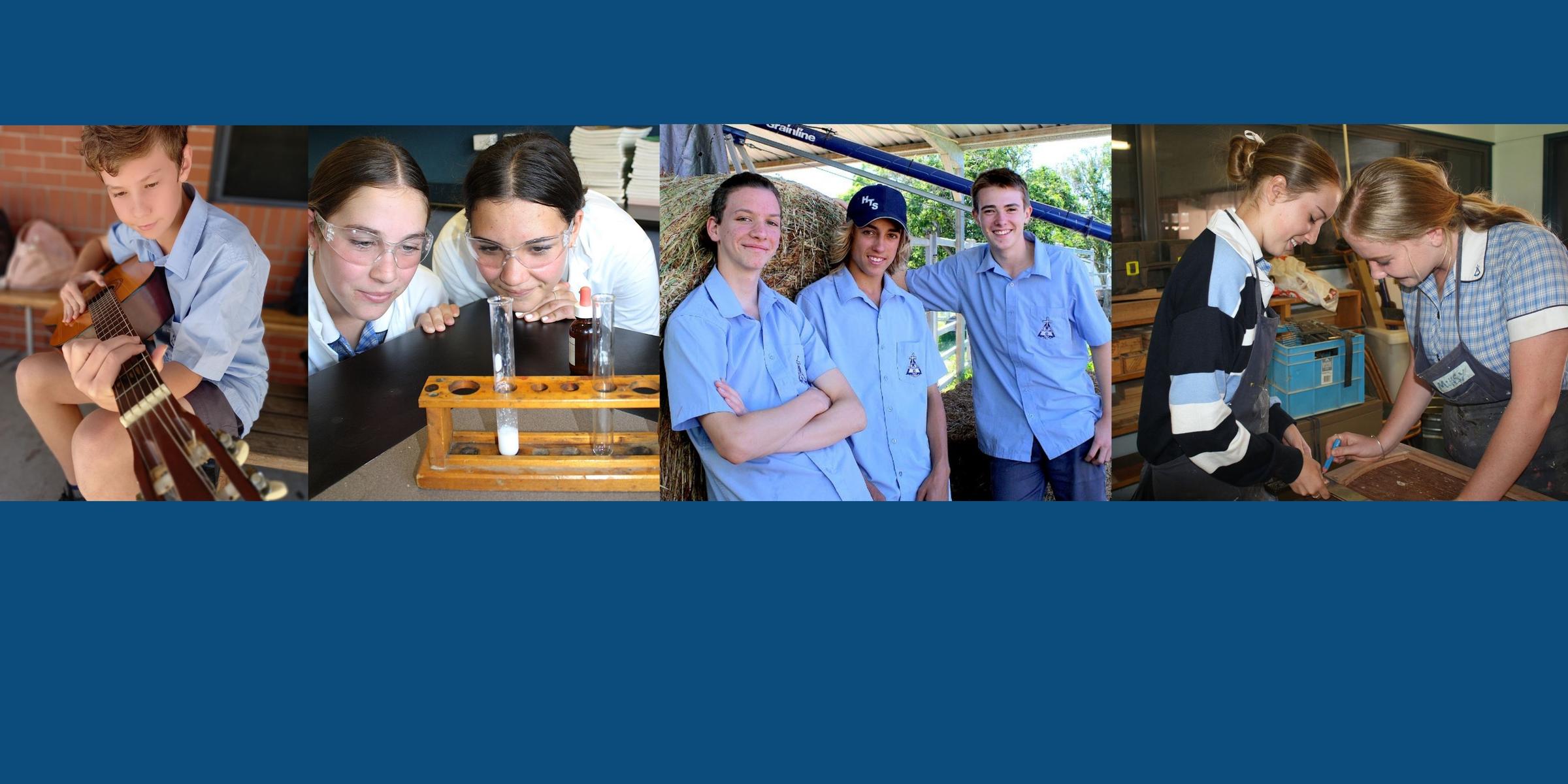SECONDARY NEWS
From the Assistant Principal
Miss Kim Bailey
kbailey@arm.catholic.edu.au

SECONDARY NEWS
From the Assistant Principal
Miss Kim Bailey
kbailey@arm.catholic.edu.au
Year 10 have been enjoying their camp at Copeton Dam this week; they will return to Inverell on Wednesday. On Thursday, they will attend a practice for the Graduation Mass and Presentation of Awards at Sacred Heart Church at 9.15 am.
The mass will be held on Friday morning and is an important school celebration and a culmination of the student’s sacramental life at school. Parents and friends are invited to attend; the mass will commence at 9.15 am and will be followed by a celebration morning tea at the church.
The Graduation Dinner Dance will be held on Friday evening at the Inverell RSM Club. It should be a wonderful way for the students to join together with family and friends to formally recognise the end of their education at Holy Trinity School.
Students and parents have received invitations to the Graduation Dinner to be held on Friday 1 December, at the Inverell RSM Club. Students have been allocated their numbers, and tickets can be purchased from the school office. We ask that tickets be purchased by Wednesday 29 November. If there are any changes or queries to the numbers already allocated, please contact Miss Bailey as soon as possible.
Thursday 30 November:
Graduation Mass Practice - 9.30 am at Sacred Heart Church.
Friday 1 December:
Graduation Mass, Presentation of Awards & Morning Tea - 9.15 am at Sacred Heart Church
Graduation Dinner Dance – 6.30 pm at the Inverell RSM Club.
A great approach for students is to undertake a simple SWOT analysis:
Strengths:
Weaknesses:
Opportunities:
Threats:
Staff are currently finalising the assessment process for their classes and preparing reports, which will be distributed at the end of the term.
All classes will be operating as normal for the remainder of the term as there is still coursework to be completed across all KLAs.
We all know that sleep is important for general health, growth and development and emotional well-being. However, you may not know that important memory processes occur while you sleep, ensuring you retain what you are learning and studying.
Perhaps you have heard that teenagers need between nine to ten hours of sleep per night. But where does this come from, and how valid is this claim? In 1980, Mary Carskadon of Stanford sequestered a group of adolescents in the university's sleep laboratory for several days, letting them sleep for as long as they wanted, up to 10 hours. She found that the teenagers slept just over nine hours, with very little variation. This single "naturalistic" study is the primary basis for the adolescent sleep recommendation. However, some researchers argue that just because teenagers slept nine hours when left alone does not mean that this is the best thing for them, just like letting people eat whatever they want is not necessarily the best thing for their health. So, there is no definitive answer at this point in time.
The amount of sleep needed by teenagers is most likely very individual, just like it is for adults. It is probably safe to assume that adolescents need more sleep than adults and that the average for most people is at least 8 hours of sleep per night. Pay attention to the signs and have students listen to their bodies. If they lie down in bed and fall asleep instantly, this is a sign they are not getting enough sleep for their body. It should take at least 15 minutes to fall asleep. If they wake up in the morning and are feeling exhausted, then check all lifestyle factors: are they getting enough sleep, eating healthily and getting enough exercise?
If teenagers are sleeping in for many hours on a weekend, unfortunately, this does not mean they are “catching up” on their sleep. According to University of Texas Southwestern sleep specialist Dr. Gregory Carter, when we think we're catching up on sleep, what we're really doing is messing with our circadian cycle -- the body's internal clock, which dictates sleep patterns. Excessive sleeping in is in fact a signal that during the week students need to go to bed earlier. The aim is to work out the optimum bedtime so that the need to catch up on large amounts of sleep on the weekend is eliminated.
There is nothing wrong with having a power nap in the afternoon when students get home from school, as long as the nap is no longer than 40 minutes. A short nap can help students regain their energy levels and allow them to focus on the work they have to do that evening. However, a longer nap will also disrupt sleeping patterns for that night.
Remember to accept the invitation to sign up for Google Classroom Guardian Summaries. Please contact Miss Bailey if you have any questions or problems.


Miss Kim Bailey
Miss Claudia Cush
Mrs Angela East
Mr Peter Ehsman
Mr Anthony Gaias
Miss Alana Goldman
Mrs Mary-Jane Guest
Mrs Lee Grady
Mrs Malynda Hiscock
Mr David Koch
Mrs Stephanie Marshall
smarshall3@arm.catholic.edu.au
Mrs Veronica McCormick
Mrs Christine McLachlan
cmclachlan@arm.catholic.edu.au
Mr Matthew Pye
Mrs Jane Taylor
Mrs Katherine Townsend
Mr Blake Uebergang
Mrs Carrie Watchirs